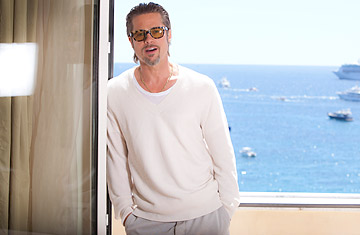
Actor Brad Pitt poses for portraits during promotion for the film The Tree of Life at the 64th international film festival, in Cannes, southern France, Tuesday, May 17, 2011.
(2 of 2)
FATHERS AND SONS
Most of the film takes place in the '50s and is the story of the boy Jack [McCracken], about 12 years old, and his growing rebellion against his father.
With sons and fathers, there's an inexplicable connection and imprint that your father leaves on you. And I think that [for Malick] there were personal elements to the story. I dare say — actually, I don't dare say! I've become the spokesman for Terry and I don't have the right. But I do know he had brothers, and lost one at an earlier age.
Do you have brothers?
I have a younger brother and a younger sister. I grew up in the same environment [in Oklahoma]. I didn't suffer the same sort of oppression from my father. My dad actually gave me a lot of opportunities; he's why I'm sitting on this couch. But as far as the environment — getting me a BB gun, spending a lot of time with me outdoors — it was similar.
Your character, Mr. O'Brien, is someone who's wracked by his sense of failure. He wanted to be a musician, and thinks of himself as an inventor, and tries to be a good father; yet he comes up short on all counts.
He's a sad man. He was poisoned by his thoughts that other people were getting ahead, and he wasn't, getting the shitty end of the stick. Then he's passing that grudge on to his kids, and feeling remorseful about that and trying to make it up to them. It's a sad story.
I got the same feeling from the father-know-best mentality that we suffered from in the last Administration. It's still prevalent in certain areas of rural America. It's not questioned, and yet at the heart of it is a great fear. You certainly see that with the father in our film: the bitterness that he carries and the oppression that he passes on. We're talking about the 50s. I wasn't there but my understanding is that there was an idyllic, even puritanical image of ourselves that stoked the kind of malaise and led us into the 60s.
CHRIST AND THE COSMOS
Terry studied philosophy at Harvard and at Oxford.
as a Rhodes scholar...
and translated a book by Heidegger that Northwestern University Press published when he was 25. And now, more than 40 years later, he's taking on issues of philosophy, religion and science — of Christ and the cosmos. There's that 17-minute sequence covering the history of the universe from the Big Bang through the age of the dinosaurs. Is that in the original script?
Yes, it was part of a very dense script that became the springboard for the film. There's also a companion piece to this that we talked about then, and that he's still working on. It's an IMAX experience, with National Geographic, that will be an hour-long version of this: from the birth of the cosmos up to God knows where he's going to end it. He's still calling images for that. And that's going to be mesmerizing.
This is not a specifically religious film, but it certainly embraces the Christian notion of forgiveness in the afterlife.
Terry has an embrace for Christianity, for all religions, but not in the textbook definition of Christianity. You're looking at a man who loves science, and has an interpretation and a feeling for God. In America those two things usually don't coincide. And yet he sees the two as one: he sees God in science and science in God.
I also grew up in a Christian environment, and as I became an adult — it doesn't work for me. I hesitate to say anything about religion, and yet I think I should say it, when so many wars are spawned by it. I got my issues; I can't talk about it without getting a little bit hot. It's probably not best for me to talk about that. But I was actually very comfortable playing within the religious iconography, because I lived that.
I'd say that Tree of Life is not a Christian so much as a spiritual film. I was surprised, watching it last night, how powerfully it struck me. What the film was saying to me is that there is an unexplained power; there is this force. And maybe peace can be found, but not by trying to explain it with the religion. Maybe there's peace to be found just in that acceptance of the unknown.
